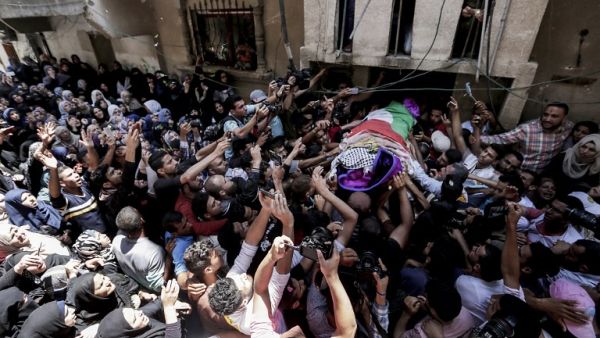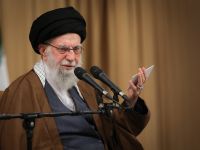By Eleanor Beevor
Despite popular (and justified) cynicism around the International Criminal Court’s (ICC) biting power, it is in fact still capable of investigating war crimes committed in Gaza. Not only can it do so, but if it wants to shake off the doubters and realise its potential as an institution of global justice, then it absolutely should.
There is no question that proceeding with a formal investigation would trigger a political firestorm. Given the current U.S. administration’s absolute loyalty to Israel, this would entail as many condemnations and threats as Washington can rain down on the ICC. It will probably involve an attempt to suspend or block the investigation at the United Nations Security Council. But there is no guarantee that these blocks would succeed.
And if the ICC demonstrates that it can fairly investigate war crimes by all sides, and survive political pressures in the world’s most contentious nexus, then would-be war criminals may at last begin to fear it.
Israeli tear gas fired to disperse Palestinians on Gaza Border (AFP File Photo)
Fighting for its political life
In practice, all judicial institutions feel a political pressure they are supposed to be independent of. But the ICC is unique among courts in that it has been fighting for its political life ever since it opened in 2002, four years after the United Nations General Assembly adopted the Rome Statute.
The Statute pledged to prosecute genocide, crimes against humanity, war crimes, and crimes of aggression. It was not to be a court for all such cases. Rather, it would work by the principle of “complementarity.” Unless a situation is referred to the ICC by a member state, or if a member state is determined to have failed to investigate one of the Rome Statute’s defined crimes properly, the ICC will not intervene.
Seven countries voted against the adoption of the Rome Statute. Not all identified themselves, but three that publicly confirmed their vote against the treaty were China, Israel and the United States. As a result, they are not members of the ICC now. Still a hundred and twenty states voted in favour of it. Unfortunately for the ICC, it has lost some member states since it began operating.
President of the Philippines Rodrigo Duterte recently withdrew his country’s membership, (although that will not legally prevent the ICC investigating crimes within the Phillipines that occurred while it was still a member). But Burundi was the first member state to withdraw, and this was because of a regular accusation that the ICC was overwhelmingly focusing on African states.
Focus on Africa
That apparently singular focus on Africa certainly looked bad. More than one commentator suggested this echoed a colonial-era mistrust, of westerners insinuating that Africans were unable to effectively manage their own affairs. That concern should not be dismissed.
However, there are some important caveats. African states were generally supportive of the Rome Statute - a large number of African Union members signed up, and some African leaders referred cases to the ICC themselves. And there is no question that the great majority of the war criminals indicted by the ICC thus far deserve to be there.
But once the ICC started going after sitting heads of state, particularly Kenyan President Uhuru Kenyatta and his deputy William Ruto, there was a wave of threats from African states to withdraw. We should not dismiss the legitimacy of the cases against the sitting presidents. And there was probably truth in the notion that some of those leaders threatening to withdraw were thinking of their own immunity rather than of justice.
But the crux of the problem is the very real imbalance of global power that the court seemed to be working along, rather than against. Bluntly speaking, prosecuting crimes in African states incurred few repercussions from members of the UN Security Council and their powerful friends. Meanwhile, crimes of great gravity in other parts of the world, though they were not exactly ignored by the ICC, often did not appear to be getting the same rigorous treatment.
Palestine
On the Gaza border (AFP File Photo)
Palestine, in the eyes of many, was one such case. But after over 1000 civilians (according to the ICC’s own figures) were killed during Operation Protective Edge, the Israel Army military offensive in Gaza in 2014, the Palestinian Authority took action.
Palestine was acceded to the ICC in January 2015, and shortly afterwards its government referred crimes committed in Gaza from 2014 to the court for investigation. Accordingly, the ICC opened a preliminary “Phase 2” investigation. This is not a formal investigation. Rather, it is to first determine whether the crimes in question fall within the ICC’s jurisdiction. Phase 2 for Palestine is still incomplete three and a half years later.
However, in response to the killings of over 100 Palestinians by the Israeli Army during this year’s Great March of Return protests in Gaza, the Palestinian Authority submitted a referral for war crimes to the ICC in May. This referral is a significant development. But it should not be taken to mean that we will see results quickly. Nor will the existing preliminary investigation necessarily be sped up.
Professor Sergey Vasiliev, an expert in Public International Law and the ICC at the University of Leiden, told Al Bawaba:
“Over three years is not a strikingly lengthy period for the preliminary examinations. The Office of the Prosecutor is not operating under statutory deadlines or timeframes, but at a speed that is situation-specific and depends, among others, on the situation on the ground and any domestic investigative and prosecutorial steps. To put things in perspective, consider some extreme examples: in Colombia the preliminary examination has been ongoing since 2004; and in Afghanistan it lasted for a decade (2007-2017).”
But these lengthy preliminary investigations raise further skepticism about the ICC’s priorities. International law expert Mark Kersten wrote in a blog that long preliminary inquiries provoke suspicion that the ICC leaves certain cases “… on the ‘low-heat’ of preliminary examination status, as a means for the Court to be able to say it is interested and active in those situations and not because it actually is.”
Israeli fighting ICC
But if the investigation were to pass all the preliminary phases, and if ICC Chief Prosecutor Fatou Bensouda eventually determined that a formal investigation should proceed, they would come up against some formidable hurdles. For one thing, Israel has repeatedly insisted that since it is not an ICC member, and since Palestine is not formally recognised as a state, the ICC has no jurisdiction in matters relating to Israel-Palestine.
Professor Vasiliev disputes this. He continued:
“In my view, Israel cannot expect this argument to bring it very far and it may be well advised to start devising ‘legal plan B’. The legal reality is that, even though Palestine is a partially recognized state, it is a state for the purpose of the ICC Statute. In November 2012, the UN General Assembly changes the status of Palestine at the UN to that of a non-member observer state; the second (January 2015) declaration by Palestine accepting the ICC jurisdiction was accepted by the Court and in the same year Palestine became a Party to the Statute. Hence it is and will be treated as such by the Court regardless of Israel’s views on its statehood. Whether any other state likes it or not, the ICC Statute is the regime that governs Palestine/ICC relationship. Under that framework, the Court has territorial jurisdiction over crimes taking place in the territory of States Parties, even if the alleged perpetrators are nationals of a State not Party to the ICC.”
No doubt Israel would also refuse to cooperate with an ICC investigation. Legally speaking, however, they cannot prohibit the ICC investigating atrocities committed on Palestinian territory. A more difficult obstacle for the ICC is article 16 in its own charter, which gives the UN Security Council the authority to suspend a formal ICC investigation if there is a risk that the investigation will threaten peace.
The United States, Israel’s erstwhile ally, could try and bring about a Security Council vote along these lines. However, the other Permanent Security Council members have the power to veto such a suspension. There is a strong chance that Russia would do exactly that if such a vote came about, and other Security Council members who have advocated for independent investigations in Gaza may follow suit.
For its part, Palestine must accept that an investigation on its territory would not be exclusively directed against Israeli forces. The court would naturally have to investigate war crimes committed by individuals from all sides on that territory. Political pressures will no doubt show their hand in the process. Sergey Vasiliev added:
“In a formal investigation, the Prosecutor will be looking into the conduct of both sides of the conflict. The Palestinian nationals – in particular, Hamas members – probably stand a slightly higher chance of becoming the first prosecutorial targets than Israeli nationals. The Prosecutor in the past often adopted the tactic of reaching for lower-hanging fruits – although the arrest of Hamas militants will by no means be an easy undertaking. However, one should not exclude the possibility of a prosecution – including a purely opportunistic one – of an Israeli national potentially of interest to the ICC, who may have the misfortune of falling in the hands of Palestinian authorities or getting arrested while on travel in another State, leading to their surrender to the ICC. It looks far from certain that Israeli nationals would end up before the ICC any time soon. But the course of international criminal justice at times takes surprising turns.”
Thus despite America and Israel’s inevitable wrath, a fair investigation of the situation in Gaza by the ICC is not only possible, but highly desirable for the institution itself. The ICC can shield itself from the charge of being anti-Israel by appropriately investigating crimes committed by Hamas and other Palestinian militants, although it must also not shy away from thoroughly investigating the the actions of the Israeli army.
If it can overcome the considerable obstacles in its path, and push ahead with this investigation as it sees legally fit, then the ICC will start to scare potential war criminals that have so far felt themselves out of reach of international law. Only when it inspires that fear will the court have achieved its potential.







